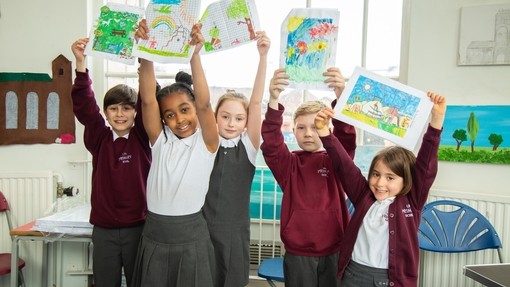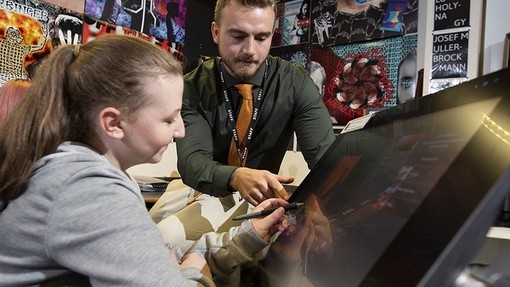
How can we remove barriers to culture and creativity for pupils living in poverty?
Poverty Proofing© is a nationally recognised tool supporting organisations to remove barriers for those living in poverty. In its work with schools, the Poverty Proofing team speak to over 35,000 pupils, family members and education staff each year, finding out how family finances impact on engagement with the school day, from learning to lunchtime. Using the findings, the team then support schools to remove stigma and barriers to participation in activities, as well as providing a report to inform long-term decision-making.
This year, Artsmark is embarking on its own Poverty Proofing journey with the charity Children North East, which runs the project. The partnership will explore how Artsmark’s services and support can promote inclusive arts, culture and creativity in schools and education settings - we’ll soon be in touch to hear about your experiences to help inform this research. To mark the new collaboration, we interviewed Lorna Nicoll, Operational Lead for Poverty Proofing at Children North East, to learn more about why it matters and how you can introduce the values of ‘Poverty Proofing’ into your teaching, so all children and young people can access the benefits of a creative education.
Lorna, what is Poverty Proofing© and why does it matter?
At its heart, our Poverty Proofing work in schools is there for the 29% of children in the UK who live in poverty and their families. It began as a creative photography project with about 1,000 children in the North East. We asked the children to take pictures of their day-to-day lives where the impact of poverty was prominent. When we viewed the images they took, one thing stood out; for children, the hardest place to be poor is school. These roots in youth creativity is one reason we’re so excited to be partnering with Artsmark on this new project.
Since then, Poverty Proofing has grown into a nationally recognised programme that speaks to tens of thousands of pupils across the country each year on how family finances impact what they can take part in at school and how it makes them feel. Time and time again, we encounter feelings of stigma associated with poverty and arts, culture and creativity are often flagged as a particular challenge.
Activities often require extra resources, the arts offer popular but paid-for extra-curricular options, and trips add further expenses. Material costs often create challenges. For example, one Year 6 pupil commented on their art lessons, saying: “If you don’t pay, you’re not allowed to take the stuff home that you make… it’s unfair, you spend all that time making it and some people just can’t afford to pay.” The burden of these small costs across the school year adds up, often putting pressure on family relationships. One Year 4 pupil shared; “I don’t want to make my mum feel bad ‘cos she can’t buy loads of stuff, so I don’t ask her.” Another Year 6 pupil said: “I beg mum to get new things, but I know how stressed she is, then I get stressed.”
Poverty Proofing matters because the solutions to some of these problems are easily achieved. Whilst we won’t solve the poverty problem overnight, decision-making that is thoughtful about the resources available to families and avoid inadvertently singling out pupils who are less well-off can transform the experience of those participating in school activities.
What’s special about the work you’re doing with Artsmark?
We’re incredibly excited to be working with Artsmark. We share their vision that every young person should have the opportunity to access a diverse, high-quality cultural education. The partnership will create the space to explore ways Artsmark can support educational settings to facilitate experiences that are inclusive for every pupil, regardless of their financial background.
What can educators do to reduce barriers to creativity for pupils living in poverty?
Any educator can start to reflect on how they bring the core value of Poverty Proofing into their practice, that ‘no planned experience or activity should identify, exclude, treat differently, or make assumptions about those children whose household income or resources are lower than others.’ Some great ideas the team have picked up around arts and culture from schools going through the Poverty Proofing process include:
Forward planning: Trips and special activities offer valuable learning opportunities but often come with a cost for families. This can cause anxiety for the pupils asking for money and we know many families turn to borrowing money to avoid their children missing out on the experience. Giving families a long lead-in time allows them to plan their finances. Some schools even go a step further and give the full calendar of costs for the year to parents in the first term.
Rethink resources: We know that school budgets can’t provide an Aladdin’s cave of paints, pencils and papier-mâché for every pupil to access! But we also know that a lack of access to materials is one way stigma impacts pupils whose weekend projects feel less exciting than their peers. Even when resources can’t be provided, teachers can help minimise the impact of this by choosing projects that reward and celebrate creativity in thoughtful ways, from using nature to limiting what materials pupils can utilise.
Shout about support opportunities, then deliver them discreetly: We’ve worked with hundreds of schools doing inspiring things to ease the burden on pupils and their families, but still struggle to engage families with that help. Some schools provide a dedicated newsletter highlighting termly support, others set up drop-in sessions to signpost local support for parents who are struggling. Often the success of help depends on discretion, so consider how that is factored in. Can equipment be loaned to a family over a term, rather than borrowed in class? Do children getting financial support for a trip have to identify themselves during that trip?
Thanks Lorna, some great tips there. Finally, what motivates you most in this line of work?
Every day I am inspired by our brilliant team and the people around me who are passionate about changing the experiences and outcomes for those living a poverty for the better. Many people at the organisations we work with may be aware of the shocking statistics around the causes and consequences of poverty but, by consulting with the people in their communities, we can shine a light on the reality of facing that challenge day in, day out. We often use the analogy of ‘the iceberg’: some of the impact of poverty is visible, like hunger or inadequate clothing. However, a lot of it is unseen, such as extra costs or feelings of shame. What motivates me is being able to expose those unseen impacts and find ways to overcome them, especially when some of the solutions can be simple fixes to the way we already do things.
Please do take the time to complete Children North East’s Poverty Proofing© survey here. To thank you for your time could* WIN an Arts Pass! *T&Cs apply.
If you want to learn more about Children North East’s Poverty Proofing© services and how they can help you achieve your goals for inclusive, accessible services and activities, you can visit their website or get in touch with Lorna Nicoll at lorna.nicoll@children-ne.org.uk.
To find out more about Artsmark, and to register for the programme click here. Sign up to our termly newsletter here.


